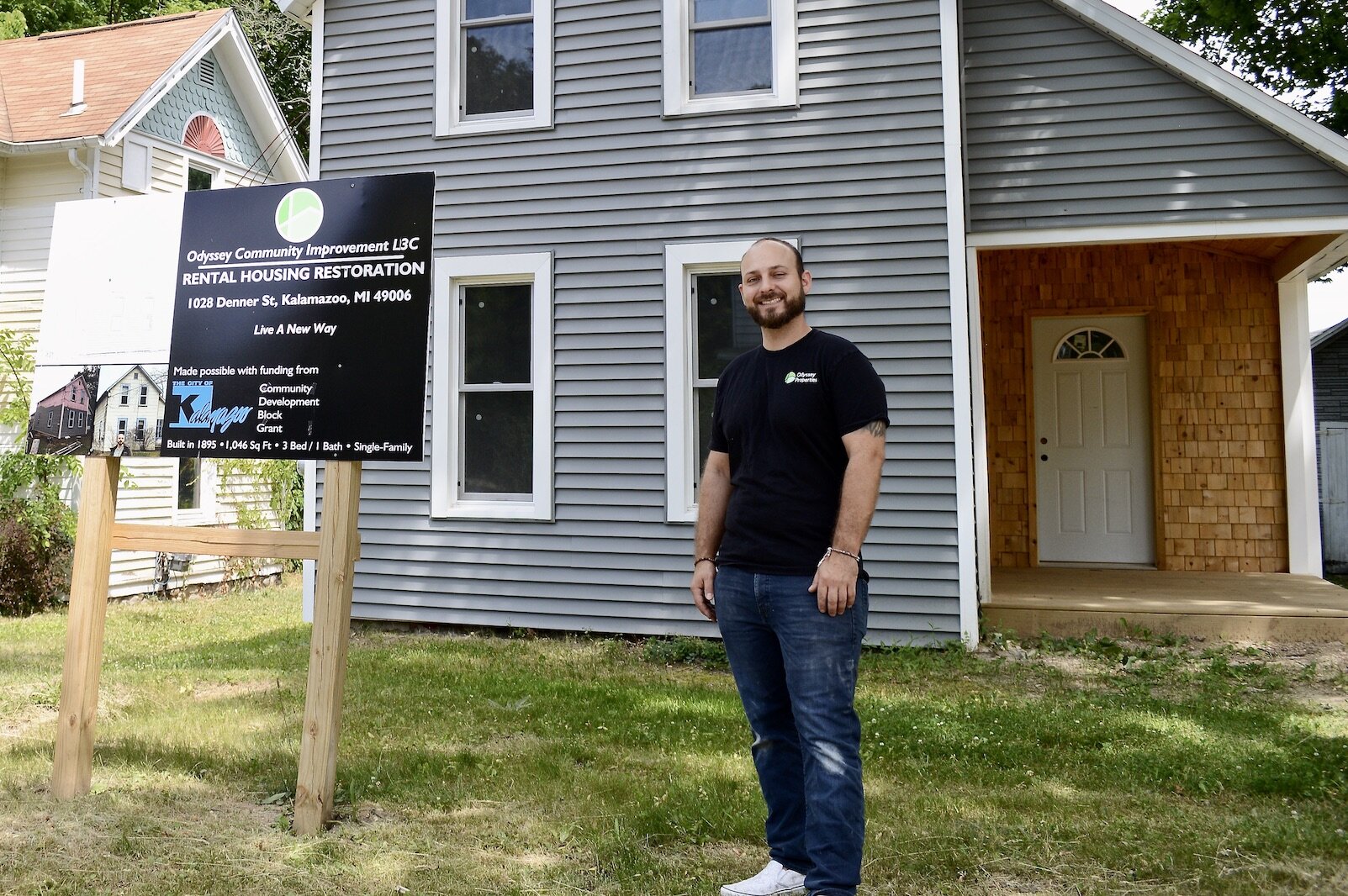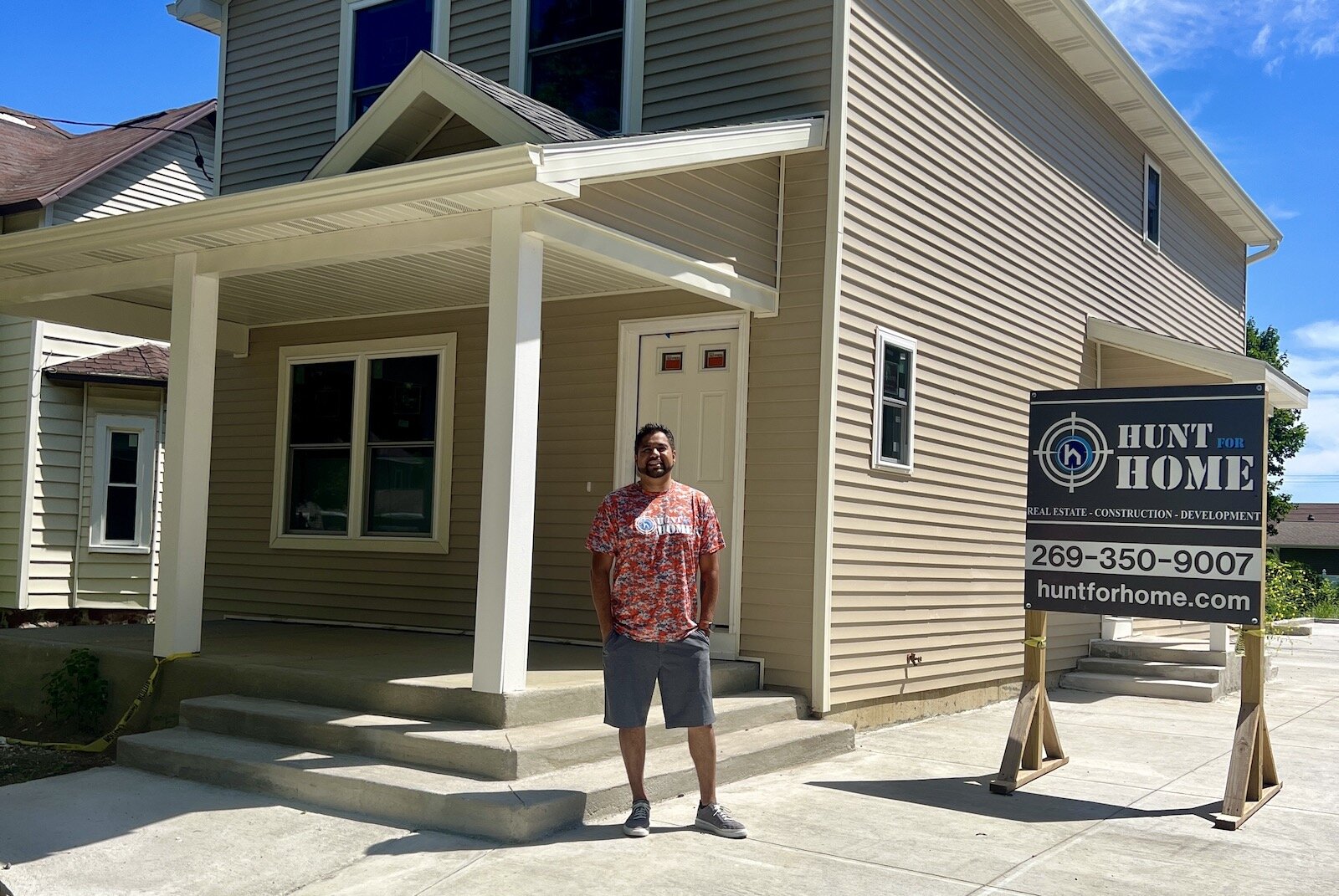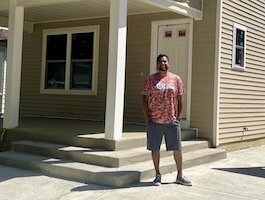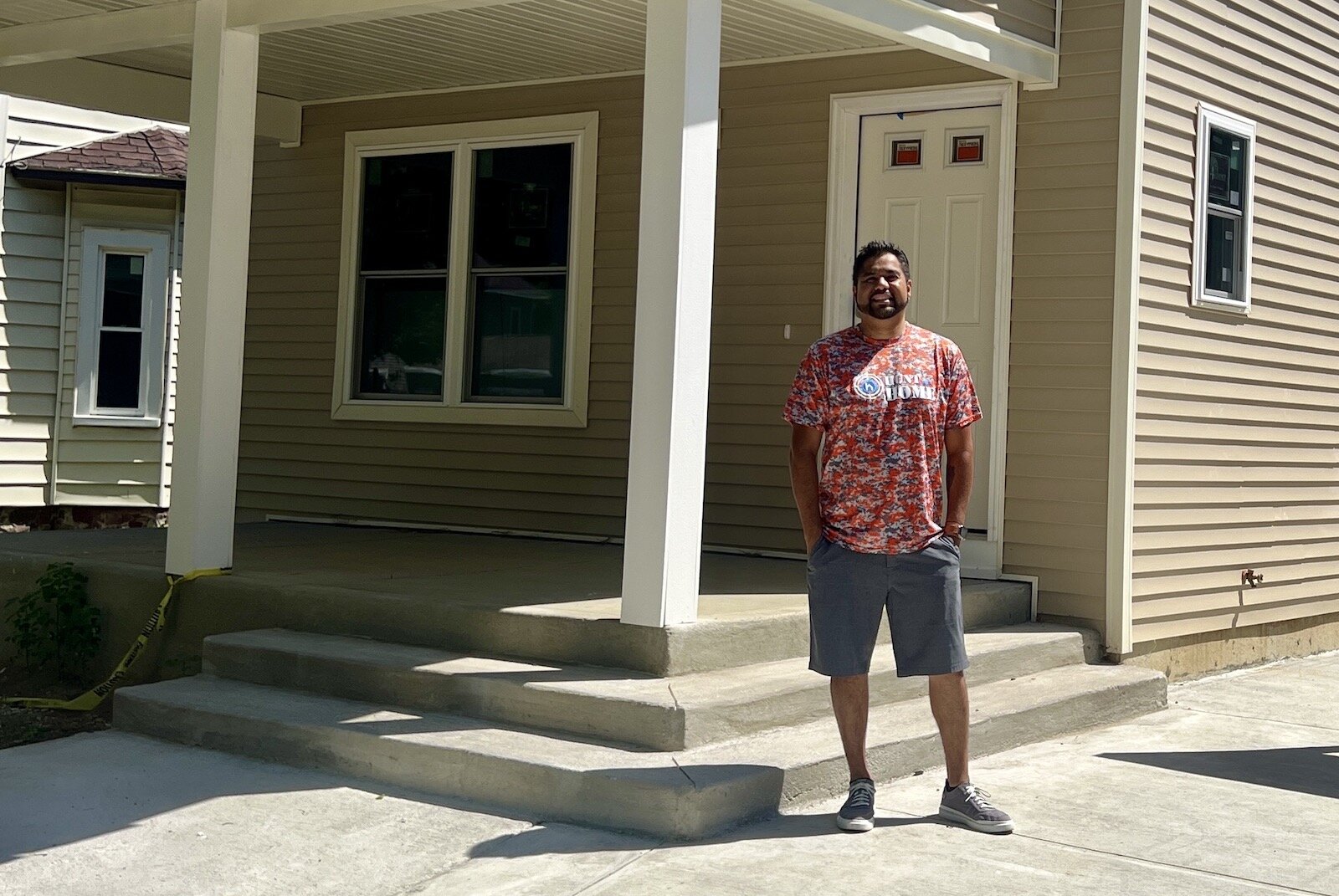A Way Home — Housing Solutions: This story is part of Southwest Michigan Second Wave’s series on solutions to homelessness and ways to increase affordable housing. It is made possible by a coalition of funders including the City of Kalamazoo, Kalamazoo County, the ENNA Foundation, Kalamazoo County Land Bank, and LISC.
Landlords are in a tough bind. The price of everything is going up, it’s getting more expensive to maintain a property, to make repairs, to keep tenants happy.
Tenants are in a tough bind. They can’t afford another rent hike. If they need to move, they can’t find a new place in Kalamazoo that fits their budget.
“You have to find that happy place where it’s uncomfortable for both sides,” Realtor, house-rehabber and landlord Ramon Huerta says.
That’s the place where rent is low enough to be tolerable for tenants, and high enough so landlords can keep up the property and make enough money so they can justify their career choice.
“For some of us, that (the properties they’ve invested in) is our retirement. We don’t have normal jobs, we don’t have 401(k)s,” Huerta says.
Then there’s a third entity here, the City of Kalamazoo, which is working to alleviate the housing crisis.

Can everyone find that comfortable place where landlords make enough profit, the city achieves its goals for the social good, and people with low incomes find homes?
We recently spoke with a handful of local landlords about the bad image landlords tend to have — accused of buying up houses, which increases demand, and then raising rents out of reach of lower-income people. We also spoke with Rebekah Kik, City Director for Community Planning and Economic Development about what landlords had to say.
“Last Week Tonight with John Oliver” covered the issue of rising rents in June. High rents are usually explained as “a supply and demand issue,” Oliver said, “and that is partially true because there are currently not nearly enough affordable units in the U.S.”
He continued, “if you are wondering why your rent is going up, it may well be because your landlord sees the current affordable housing crisis as a chance to reset market rates.”
Oliver placed a lot of the blame on faceless corporate landlords buying up property and creating more luxury developments than affordable spaces.
Jen Handlin
The landlords we spoke with live in Kalamazoo county and rent out homes here. They aren’t “the big dogs,” as Jennifer Handlin refers to large corporations who own and rent area apartment complexes, duplexes, and houses.
What could local landlords do to help increase the amount of affordable housing in Kalamazoo? we asked.
“I do believe there has to be an answer to this, but it can’t just be on the backs of us small, blue-collar landlords,” Handlin says. “When we talk about why are rents going up, I have to say look at PlazaCorp, look at AIM, look at all these large corporations and what they’re renting. Because they’re the big dogs, they’re dictating what the price is.”
It’s probably not realistic to ask landlords to provide enough low-cost housing to help Kalamazoo’s housing crisis, we suggest. It’s understood since being a landlord is a business. It’s not necessarily work that sets out to do a social good–
Handlin cuts off that line of thinking. “I almost want to disagree with you on that. Honestly, I am trying to create a nice home…. I do it because I’m passionate about it, and I love it. And I think a lot of us do, us small landlords who are trying to improve neighborhoods, one house at a time,” Handlin says.
“Giving keys to somebody, it’s a fabulous experience. Where, with these larger corporations, it’s about the dollar. There’s no personal touch, and that’s the part that irks me,” she says.
Handlin started with one house when she was a college student in Minnesota. She now has 21 units in Berrien, Cass, Calhoun, and Kalamazoo. She rehabbed many to either flip or keep as rentals.
“I do believe I’m under the average going rate for a three-bedroom or two-bedroom in Kalamazoo right now,” she says. Handlin has a three-bedroom renting for $1,000 a month. Another landlord recently told her “that is way too low,” she says with a laugh.
Similar houses could go for $1,200 to $1,400 a month, she says.
“I want to give the best home that I could provide for what the average going rate for what the market is dictating.” Handlin says she would feel bad renting the same house for $1,400. “It blows my mind. I don’t know how people do it.”
Jeffrey Caron
“The market rate for rents is astronomical right now,” Jeffrey Caron says. He’s seen three-bedroom houses go for “$1,500 a month or more.”
Caron used to work in a machine shop. He left that behind in 2006. “I was 53 years old. I gotta do something.” So he thought he’d get into landlording.
A friend had been doing it since 1975. Caron told him, “That sounds like fun.” The friend said, “You’re crazy.”
Caron bought four houses, rehabbed them, flipped a couple, and rented the others. He survived the housing crash of 2007 and now rents out two.
“I’m pretty small-time,” he says, though he’s a regular at Kalamazoo Real Estate Investors Association (KREIA) meetings.

What he’s seen is that “there are so many dilapidated homes in Kalamazoo. House after house that’s just not up-to-code.” Most of the houses around the city are a century old or older. Around the housing crash of 2007-2008, “People were buying homes that were built in the ’20s that really hadn’t been worked on at all.”
There was a lot of “flippin,’ ” Caron says. “But, man, that is so expensive…. You take a house that somebody gives you for free, and you spend $100,000 to gut it out, redo it, and make it habitable. … That was my experience from 15 years ago. You can easily spend $70,000, $80,000 just doing basic stuff.”
Caron mentions a Kalamazoo landlord that has not only been buying up dilapidated houses and fixing them up, but he’s also been able to rent them out at below market rate. “Jake is really focused on this, his mission…”
Jake Tardani finds the upside
Jake Tardani, who we met with early in July, has been able to fix up homes and keep rents low through the City of Kalamazoo’s and U.S. Department of Housing and Urban Development’s Community Development Block Grant.
Tardani says he knows there are other landlords who have issues with the city, and he knows “of landlords charging high, high rents.”
There is red tape he has to deal with. But in spite of that, he’s having success working with the city, and has faith that “we can still continue to do good.”
Ramon Huerta
Huerta knows of Tardani’s mission. He knows there are some landlords willing to work with the city and others who’d rather have no involvement from the city or other governmental entities.
When it comes to accepting public grants, the rule is, “Whoever has the money, makes the rules, right?” Huerta says. “Just like with the bank — you want a loan from the bank, they’ll have rules and regulations. Same thing with the city.”

“I personally don’t see one being better than the other. It really just depends on what it is that you’re trying to accomplish.” Huerta is working with the city on several projects, “and I just kind of pick and choose.”
Huerta is the organizer behind the Kalamazoo Real Estate Investing Club and is on the board of a local association of landlords.
“I see it all,” he says. What he sees is, “There’s no right or wrong way” to buy and rent out units.
Progress is being made
“Overall, the city tries to do what they can,” in keeping rents affordable, he says. Landlords and the city have different goals, different mindsets, he says. But it’s important for landlords to maintain a relationship with the city if they expect to work with local housing programs. They need to keep aware of ordinances and zoning issues, etc.
“There are other (property) investors, too, that are more private and under-the-radar, and don’t go to these public meetings. They’re not worried about money being provided (through city, state, or federal programs) or anything like that. They’re just doing it on their own,” Huerta says.
“Again, when you’re dealing with HUD money or any governmental entity money, there are stipulations that come with that. And sometimes, with investors, you don’t want to be told what to do or how to do it,” he says.
“And there’s some who love the programs and do great. I think it’s just a balance that depends on your personality and depends on what you’re trying to accomplish. “
Handlin says when it comes to housing, “lots of changes are coming about, both good and bad. I would like to see more of a collaboration with the city, with landlords.”
Overall, relations between the city and landlords have been a “pointing-fingers kind of experience,” she says.
Cost, Risk, and Section 8
Handlin runs through her expenses: Insurance, taxes. Contractors, materials, “wood, look at wood!” — everything is either rare or rising in price.
Huerta compares renting with being a homeowner. “A person that rents has a certain mentality — hey, if something breaks, you just pick up the phone and you call the landlord or the management company or complex or whatever…. You just have to make sure you’re paying your monthly payment.”
Homeowners are burdened with all the repairs, all the responsibility. “Now you have to call Roto-Rooter, and it’s $178 just for them to show up,” Huerta says.
Landlords have all of that responsibility and are under additional strain because of inflation.
They might manage to make $200 a month off of a house, Huerta says. If, for example, the roof needs repair, that landlord might wait a few months, and bank that $200 until they have enough for the roof. They might find that they’ve waited too long, inflation has put the cost of the project out of reach, the roof becomes a disaster, and the tenants suffer.
Add to that the pressure to keep rents low. If the landlord is keeping rents below market rate, “what’s going to happen when the roof starts leaking? What’s going to happen when that furnace goes out?” Huerta asks. “Now you have a bad landlord, right?” The landlord is accused of not taking care of the property. “But how can the landlord take care of it if it’s only making $200 a month?”
Huerta sees “this harsh disconnect from one end to the other, and sometimes you can’t have those kinds of conversations, just because it’s a very sensitive matter. Nobody wants to be told what to do.”
One sensitive subject is Section 8.
“I do Section 8. I don’t have any issues with housing assistance. I work with them. I understand the rules,” Handlin says.
She then brings up a tenant in another county whose dog had gone on a destruction spree costing $4,500 in damage. Another tenant on assistance had a boyfriend who burned the house down.
She asks, “Where’s the accountability with some of the programs?” She suggests that there could be “some kind of guarantee or insurance program that pays for the damages.”
“I would say fine, that sounds great, as long as you got my back, I got yours.”
Empathy
Huerta says he’s had good tenants and bad regardless of how they pay the rent. “I’ve done Section 8 before, and I’ve had some of the best tenants, and they took care of the property. They were prideful of where they lived.”
He wishes there could be some empathy for landlords and tenants.
He works to have a good relationship with his tenants. “But at the end of the day, it has to make financial sense or else why are you doing it? It’s not a hobby for me, I don’t have the financial resources where I can just throw money out there, and hopefully, something happens.”
What helpful measures could the city provide landlords?
“I don’t know that it’s up to the city. It’s up to the community itself, and being empathetic,” Huerta says.
“There’s not a one thing that cures all. We’re not going to find a magical pill that’s going to alleviate all of the symptoms that Kalamazoo has. It’s going to take a bunch of different people being creative and working together to start making the city healthier.”
Huerta says about politics, “That’s not my lane.” But he sees passionate people in city government, as well as in local nonprofits, working to help people who are homeless or housing-insecure.
“Somehow they have to work with a landlord,” he says about those trying to help. “They might not agree, they might not have the same philosophy or thought processes or anything like that. When a landlord talks about a business, that’s probably a turn-off. If they’re talking about humanity… the landlord has to absorb some of that humanity, too, and be empathetic of that. You just have to balance that and work together.”
The City’s new attitude
Caron says that landlords have felt like they face a barrage of “you can’t do this, you can’t do that” from the city, its zoning codes, and housing ordinances.
He mentioned rules preventing ADUs, additional or accessory dwelling units — garages or basements turned into apartments.
Also, there’s long been an ordinance against more than three unrelated people sharing a unit, which doesn’t seem to be enforced, but it’s on the books, Caron says.
Rebekah Kik, city Director for Community Planning and Economic Development, wants Kalamazoo landlords to know that the city’s attitude toward such ordinances has been changing. “It’s a new day,” she says.
The city passed an Accessory Dwelling Unit Allowance that changed the codes in 2019, she says. ADUs are allowed in most zones in the city, though there may be a few houses in commercial or manufacturing districts where they aren’t allowed. In those cases, Kik says the city’s attitude toward landlords is, “Can we get you a variance?”
“It’s not our intent to leave houses out of this, because we know that ADUs could help with affordable housing,” she says.
The ordinance against unrelated people in a single unit is rarely enforced. “It’s not something that we proactively go after,” she says. The city will crack down on a house only if there is a legitimate complaint about its many tenants causing problems — usually complaints are aimed at student rentals.
“I think there’s been a real turnover in our department in the past five years,” Kik says. “We’ve got very different managers in place…. We’ve made a lot of changes. I know there are a lot of hurt feelings out there from past inspectors, past administrators of the program (the Rental Registration Program).”
The city is hoping for more communication with local landlords, to work together to find solutions that might ease Kalamazoo’s housing crisis.
In response to landlords’ feelings of finger-pointing, Kik says the city has been forming a new attitude towards the “whole housing ecosystem.”
“I was just talking to our city planner today about how we can engage our landlords in a better dialog. I know there are a lot of issues out there. We have more money now than we’ve ever had before, with the Foundation for Excellence, Housing and Urban Development dollars,” and non-profits providing other programs for landlords, Kik says.
“We need a lot of feedback from (landlords) to design a program that would be helpful for them. We have some ideas, but it would be really great to sit down with them and talk to them about it,” she says.
“In the past, there probably has been a lot of finger pointing. Because we didn’t have any money, we didn’t have any way to solve things, everybody just kinda wanted to say, ‘eh, not my problem.’ I hope that our attitude is shifting now, especially in the city,” she says. “We’re all trying to solve the same problems, have quality housing for the best price possible.”
There are some landlords, Kik says, who might be raising the market rate for rents. “Maybe they are the big corporate guys, who are saying, ‘Hey, if I can charge $2,200 for a one-bedroom apartment, that’s what I’m going to do.’ But we also have very community-minded landlords who also live in the city, and who also want to support city residents.”
She continues, “Again, those (community-minded landlords) are the landlords we’re designing the programs for, right? We’re not designing the programs for landlords who are just going to build market-rate housing. We need a partner.”
Help for landlords who provide low-income housing
The landlords we spoke with suggested tax relief for landlords who keep rents low and help like insurance policies for units rented to people on assistance.
Kik listed a number of programs the city participates in, that may help:
Payment in Lieu of Taxes. A state program that the city participates in, PILOT provides some tax relief for landlords using federal dollars to rehab multiple houses or to build new housing.
RentAble. The United Way/Continuum of Care program provides a standard one month’s rent security deposit plus an additional $1,000. Low-income renters get help moving in, and landlords get some insurance for potential property damage and unpaid rent.
HUD grants. Applications for HUD grants are closed for this year, but the city will help landlords get federal dollars to rehab housing.

















